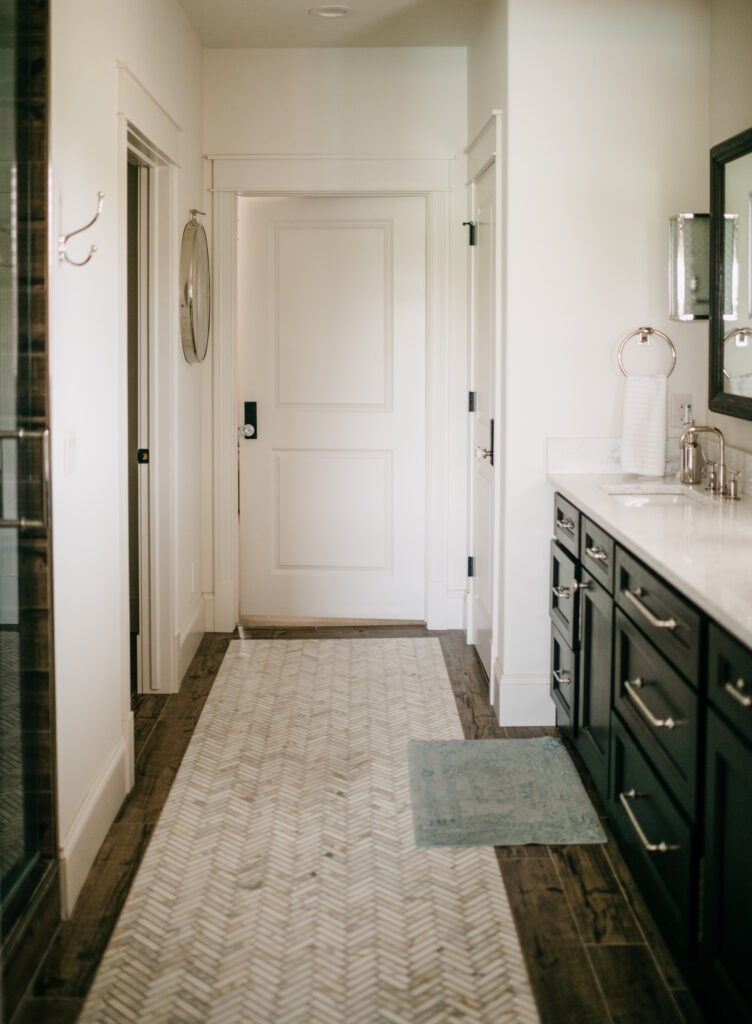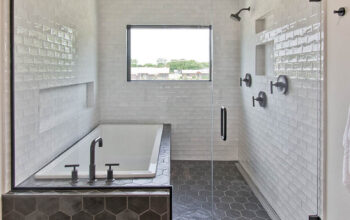The first step in proper natural stone care and maintenance is to understand your stone’s geological classification and composition. Read our blog on the Basics of Natural Stone Care. This information will help you to identify what cleaning products to use and how best to care for your natural stone.
EASY NATURAL STONE CARE
The most common natural stone flooring includes slate, marble, quartzite, limestone, travertine, granite, and sandstone. It’s important to know what cleaners are safe for these surfaces before cleaning. Always follow manufacturer cleaning recommendations.
Clean stone surfaces with a neutral cleaner, stone soap, or a mild liquid dishwashing detergent and warm water. Similar to any item cleaned in your home, an excessive concentration of cleaner or soap may leave a film and cause streaks.
For best results:
- Use a clean rag mop on floors and a soft cloth for other surfaces such as backsplashes and showers.
- Rinse the surface thoroughly after washing with the soap solution and dry with a soft cloth.
- Change the rinse water frequently.
- Repeat as necessary.
In the showers and other wet areas, soap scum and water stains can be minimized by using a squeegee after each use.
To remove soap scum from natural stone use a non-acidic soap scum remover or a solution of ammonia and water (approximately a 1/2 cup ammonia to a gallon of water). Frequent or over-use of an ammonia solution may eventually dull the surface of some stone types.
In outdoor pool, patio, or hot tub areas, flush with clear water and use mild bleach solution to remove algae or moss.
SPILLS
- First, immediately blot the spill with a paper towel. Don’t wipe the area as it will spread the spill.
- Then, flush the area with water and mild soap and rinse several times.
- Lastly, dry the area thoroughly with a soft cloth.
- Repeat as necessary.
Cleaning Grout
Depending on how dirty your grout is, hot water, a scrub brush, and elbow grease may be all you need to clean your grout.
For soap scum and other grime, you may need to take it up a notch by mixing together the following solution.
- ½ C. Baking Soda
- ¼ cup Hydrogen Peroxide
- 1 t. Dish Soap
Apply the solution to grout and wait a few minutes before scrubbing and rinsing.

Reduce potential hazards by using rugs and carpet runners in hallways, bathrooms, and at entrances to help dry shoe soles.
PROTECT YOUR STONE FLOORS
To get the longest life and preserve the beauty of your tile, follow these simple tips:
Sealing Of Natural Stone Is Recommended
Sealing your natural stone flooring makes it less porous, more stain-resistant, and protects the stone’s original beauty. This action should be performed on most natural stones about once every six months. There are different types of sealers for different types of stone. Please note that sealing the stone does not make it stain proof, but makes it more resistant to staining. If a sealer is applied in a food preparation area, be sure that it is non-toxic and safe for use.
DUST MOPPING
Use a clean, non-treated dry dust mop on interior floors frequently and as needed.
DOORMATS & RUGS
Doormats or rugs placed at inside and outside entrances will help to minimize the sand, dirt, and grit that may scratch stone floors. Natural stone surfaces can also become slippery when wet. Reduce potential hazards by using rugs and carpet runners in hallways, bathrooms, and at entrances to help dry shoe soles. Be sure that the underside of the mat or rug is a slip-resistant surface.
VACUUM CLEANERS
When using a vacuum cleaner, be sure the attachments (metal or plastic) and the wheels are not worn as they can scratch the surface of some natural stones.
SELECTING CLEANING PRODUCTS
Use caution when selecting cleaning products for your tile and grout.
- Products containing bleach, ammonia, lemon, vinegar, or other acids can dull or etch your porcelain or ceramic tile and/or grout.
- Bleach and ammonia can stain your grout lines and irreversibly damage the color of your tiles.
- Steel wool, scrubbing too hard, or using scouring powders or creams can scratch tile causing them to lose their luster or finish.
- Further caution should be used when utilizing other household chemicals around or near your tile. Many commercially available rust removers, such as laundry rust stain removers and toilet bowl cleaners, contain trace levels of hydrofluoric acid. The acid attacks silicates in addition to other minerals.
- Metals, most commonly mixed in with tile mosaics and used as finishing edges, are highly reactive to bleach and will almost immediately begin to corrode or rust.
Visit us on Youtube for more Care & Maintenance advice about other types of flooring products!



